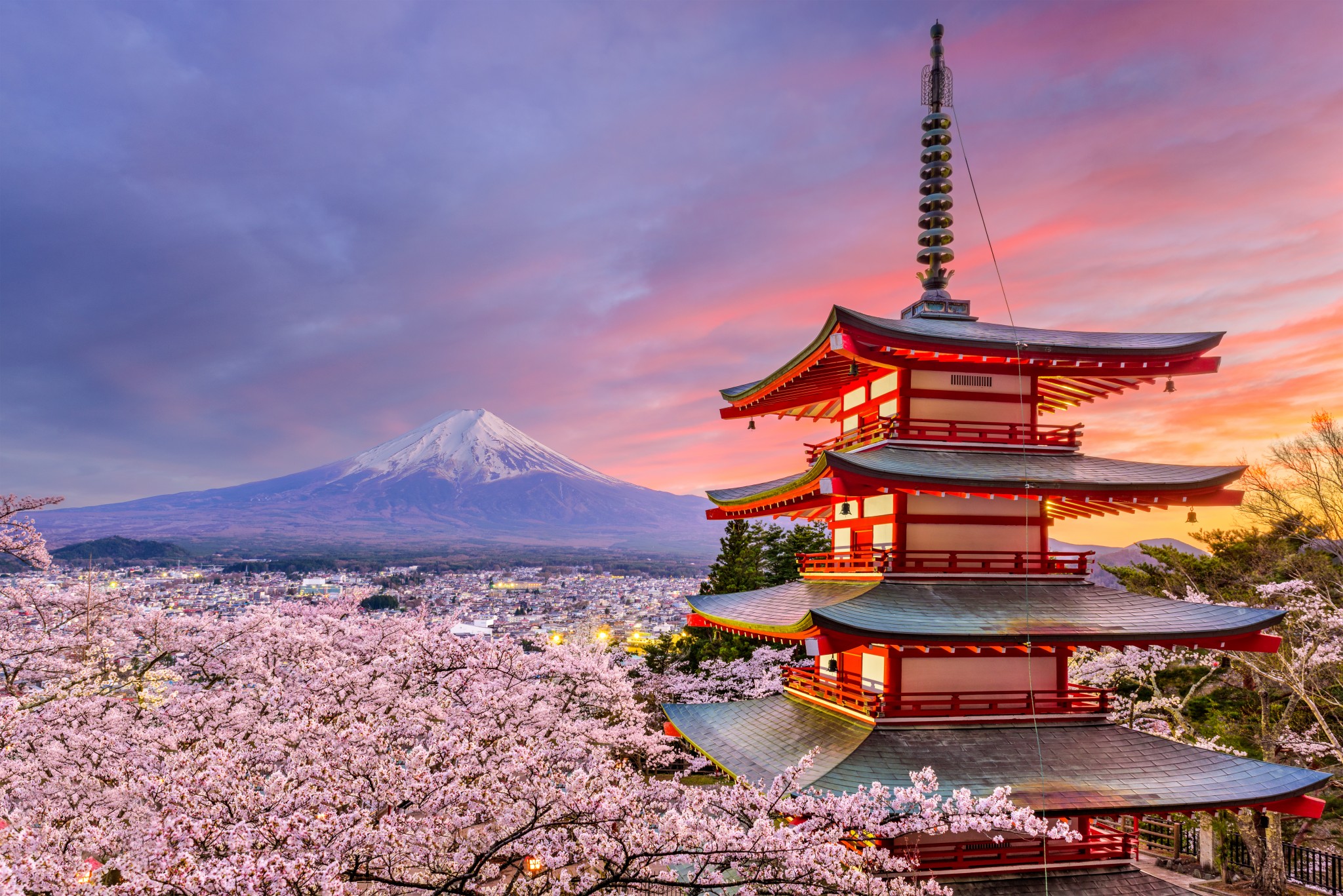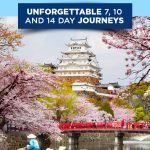Some destinations reward spontaneity – in Europe, cheap flights and rail passes give you the freedom to wake up in the morning and choose your next destination on a whim. Japan, on the other hand, rewards forward planning.
The country’s abundance of both natural and manmade attractions, combined with its high standard of living and general efficiency, make it a fairly pricey destination. The more you plan, the better you can mitigate the damage to your wallet, and get the most out your trip – no matter how long you plan to stay.
These itineraries are designed to inspire you to build your own trip. Based around a few key highlights that represent both modern and ancient, they’re crafted to give you a rich and satisfying experience of Japan in 7, 10 or 14 days. Let’s jump right in!
Psst: want more tips for planning a trip to Japan? Check our rail pass guide and cheap eating tips.
Getting Around
Before we get to the itineraries, there's one important piece of planning to keep in mind – whether or not to get a JR pass. A Japan Rail (JR) pass is exclusively available to tourists, and grants you unlimited travel on JR trains within Japan, including the world-famous bullet trains. Depending on your itinerary, this will save you time and money vs buying individual train tickets within Japan. But importantly, you must purchase the pass before you arrive in Japan. We recommend ordering from Klook for their low prices and 10-day global delivery.
We've marked the itineraries that we recommend the JR pass for below, but for a more in-depth guide, be sure to read our full guide The Japan Rail Pass: Is It Worth The Cost?
7 Day Itinerary: Tokyo and Mt Fuji (Fuji Five Lakes)
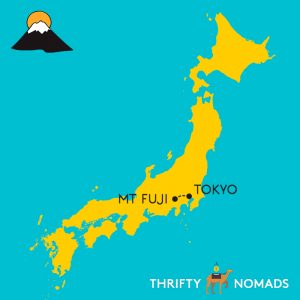
Overview
Get the essentials of urban and rural Japan with four days in the unforgettable capital, followed by three days of reflection and recovery under the shadow of Mt Fuji.
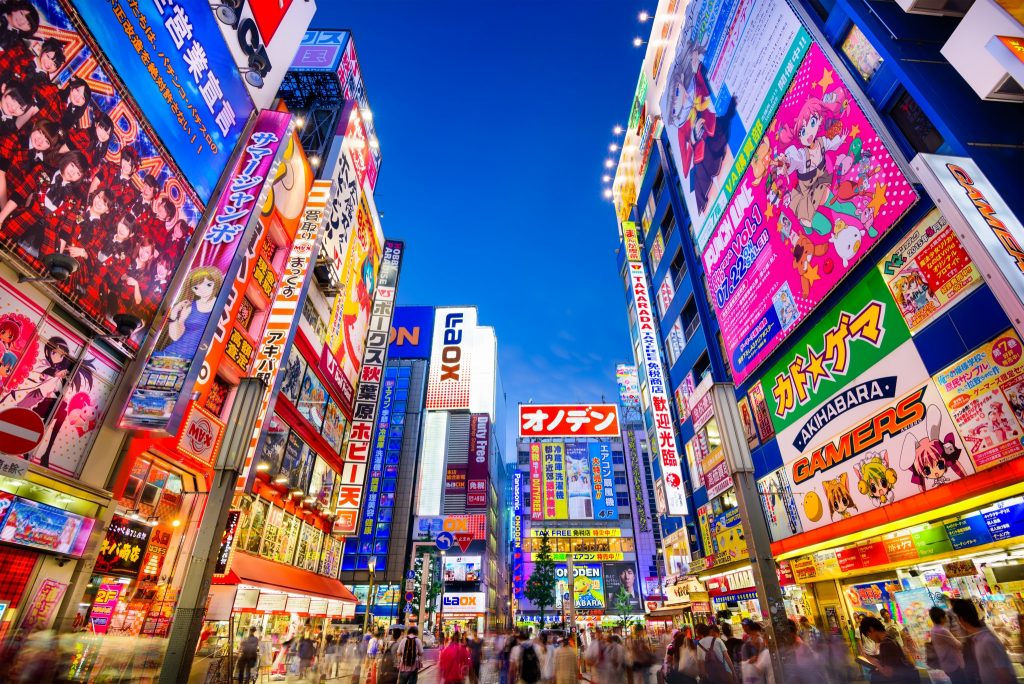
Tokyo: 4 Days
- Highlights: Go crazy in Japan’s frenetic, eclectic and incomparable capital. Live out a manga fantasy in Akihabara, drink shoulder to shoulder with locals in Roppongi, and see the world’s largest metropolis in 360 degrees from the top of the Tokyo Tower. And for an immersive digital art experience, check out the popular teamLab Planets TOKYO Museum.
- Where to stay: Public transport is comprehensive, so search far afield. Roppongi neighborhood if you like nightlife, Shinjuku to be close to the beating heart. Use TripAdvisor to compare hotel and hostel deals across all booking sites along with thousands of reviews.
- What to eat: Chains like Sushiro ($1 / plate train sushi) and the ubiquitous Gyudon houses like Yoshinoya can get you a delicious local meal for a budget price. Check out a Maid Cafe for an authentic (if risque) local experience!
Mt Fuji: 3 Days
Tip: If you don't have 3 days to spend in Fuji, you can book a full day tour from Tokyo.
- Highlights: See why this 3776 meter high mountain has inspired artists, writers and pilgrims for countless centuries. Soak up the volcanic waters in the Five Lakes District, a major tourist destination since the 1920s, it’s still possible to get away from the crowds and immerse yourself in nature.
- Where to stay: The Five Lakes Region contains a wealth of hotels and resorts. If you’re striking out, try a bit further away from (but still in plain view of) the mountain in Hakone district. Compare across booking sites with TripAdvisor's hotel search.
- What to eat: Try the regional speciality: udon noodles, often served cold in a delicate, flavorful sauce.


7 Day Itinerary: Osaka, Kyoto and Nara
Overview
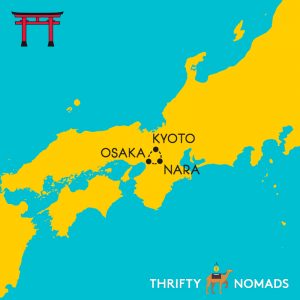 Bypass the capital and you can still experience the highlights of Japan’s present and past. These three cities are remarkably close together, yet each gives you a new perspective on a country that is committed simultaneously to tradition and innovation.
Bypass the capital and you can still experience the highlights of Japan’s present and past. These three cities are remarkably close together, yet each gives you a new perspective on a country that is committed simultaneously to tradition and innovation.
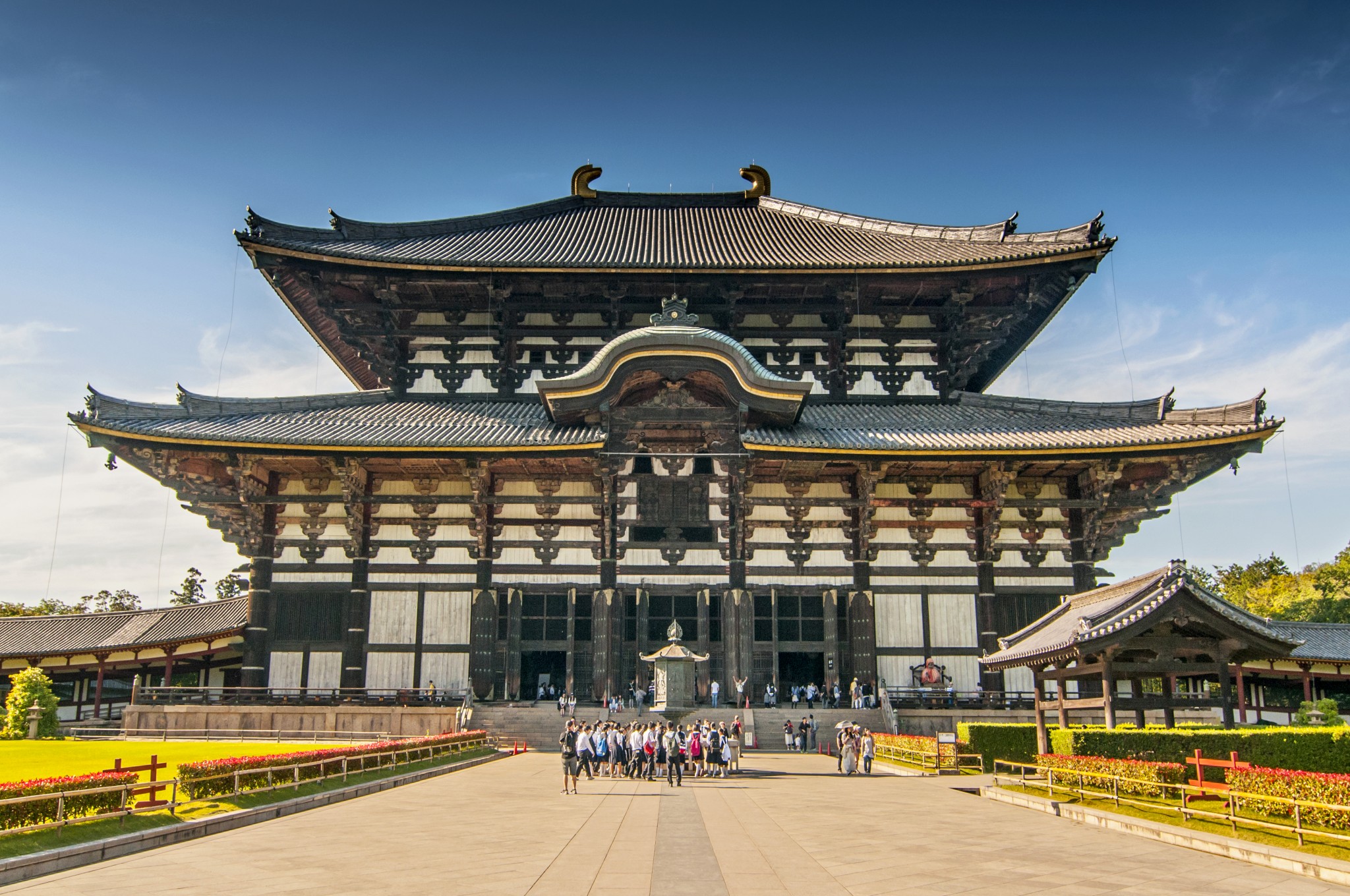
Osaka: 3 Days
- Highlights: Japan’s second biggest city is a microcosm of everything that magnetizes visitors to the country. Gaze in awe at giant plastic sea creatures and effusive street vendors in Dōtonbori, wander among the tuna merchants at the fish market, and connect with history at the 16th century Osaka Castle. Get to know Osaka like a local with a highly-rated walking tour.
- Where to stay: Try AirBNB and trust the train network if you find a good option a little outside of town. For hotels and hostels, compare across booking sites using TripAdvisor.
- What to eat: The same budget chains in Tokyo will serve you well here (I practically moved in to my nearest Sushiro!), but you really must try the street food on Dōtonbori.
Kyoto: 2 days
- Highlights: After the urban grunge of Osaka, it’s time to embrace the Japan’s spiritual side at the ancient seat of empire. It’s still possible to see Geisha in the historic Higashiyama District, which you can even explore by rickshaw, and the subtle beauty of temples like Kinkaku-ji is simply too much to put into words. Make sure you catch everything there is to see with a custom-made walking tour with a local. Go!
- Where to stay: Downtown Kyoto is the most convenient spot for sightseeing and will allow you to cover much of the historic town on foot. Try Airbnb or compare hotels and hostels across booking sites with TripAdvisor.
- What to eat: Restaurant prices can be steep so take a trick from the locals and stock up on tasty (and filling) instant meals at chain stores like the ubiquitous 7/11
Nara: 2 days
- Highlights: Stick with the theme of history but swap the Geisha for sacred deer in Nara, Japan’s capital from AD 710 to 794. In Nara park you can sip green tea in a traditional “Chaya” tea house and watch the deer frolic over 700 year old ground. Hire a local guide to make sure you catch it all!
- Where to stay. While it’s possible to day trip from Osaka, the town is well worth staying overnight – guest houses are abundant and there are even hotels in the historical park! You can compare all your options and find the best price using TripAdvisor.
- What to eat. Vegetarian food and pickled delicacies are the local specialities, due to the surrounding mountains and buddhist communities.


10 Day Itinerary: Tokyo, Mt Fuji and Kyoto
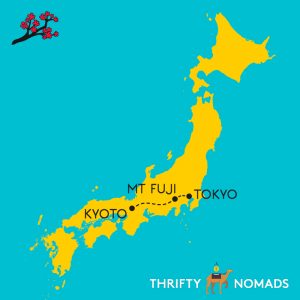 Overview
Overview
Got 10 days? Let’s do it right. Take a deep dive into the capital, cleanse yourself with nature in Mt Fuji and the surrounding 5 Lake District, and transport yourself back in time in Kyoto – a rich overview that will leave you feeling refreshed, satisfied and exhilarated.
For this itinerary, we recommend a JR pass. It will save you precious travel time on the bullet train, and save you money on train fares between, and within, Tokyo and Kyoto. Remember to order your pass BEFORE you enter Japan (we recommend Klook). If you're still unsure, be sure to check out our in-depth guide on whether the JR pass is worth it.
Tokyo: 4 Days
- Highlights: Lose yourself among the neon lights of Shibuya and have a drink at the Monster Cafe. Watch locals transform themselves into Manga characters on an anime/gaming tour in Akihabara, drink hot sake with locals in Roppongi, and let digital art completely immerse your senses in Japan’s unforgettable capital.
- Where to stay: Public transport is comprehensive so search far afield. Roppongi neighborhood if you like nightlife, Shinjuku to be close to the beating heart.
- What to eat: Tokyo has unlimited dining options – if you’re on a budget, try Gyudon and brave the budget chains where it’s still possible to order with ancient vending machine located by the kitchen!


Mt Fuji: 3 Days
Tip: If you don't have 3 days to spend in Fuji, you can book a full day tour from Tokyo.
- Highlights: Make all your instagram followers jealous as you soak up the steamy volcanic waters under the shadow of Japan’s largest and most famous mountain.
- Where to stay: The Five Lakes Region near the mountain contains a wealth of hotels and resorts. If you’re striking out, try a bit further away from (but still in plain view of) the mountain in Hakone district.
- What to eat: Try the regional speciality: udon noodles, often served cold in a delicate, flavorful sauce.
Kyoto: 3 days
- Highlights: The twin temples Kinkaku-ji and Ginkaku-ji (gold pavilion and silver pavilion) have been carrying out an architectural and spiritual debate for centuries. It’s still possible to see Geisha in the historic Higashiyama District, which you can even explore by rickshaw. Make sure you catch everything there is to see with a custom-made walking tour with a local.
- Where to stay: Downtown Kyoto is the most convenient spot for sightseeing and will allow you to cover much of the historic town on foot.
- What to eat: Live out a warrior fantasy at the Samurai Restaurant. It’s a bit kitsch and definitely designed for the tourists, but so what – you’re on holiday!
10 Day Itinerary: Osaka, Kyoto, Nara and Hiroshima
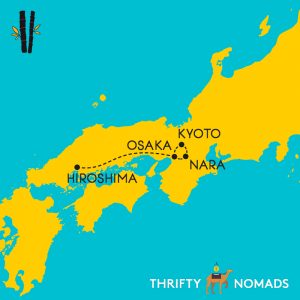 Overview
Overview
Get the best of Japan today and yesterday in racey Osaka, tranquil Kyoto and serene Nara, before coming face to face with perhaps the darkest period of Japan’s history at Hiroshima.
For this itinerary, we recommend a JR pass. It will save you tons of travel time on the bullet train to Hiroshima, and save money on train fares within the Osaka/Kyoto/Nara area. You need to order your pass BEFORE you enter Japan (we recommend Klook). If you're still unsure, be sure to check out our in-depth guide on whether the JR pass is worth it.
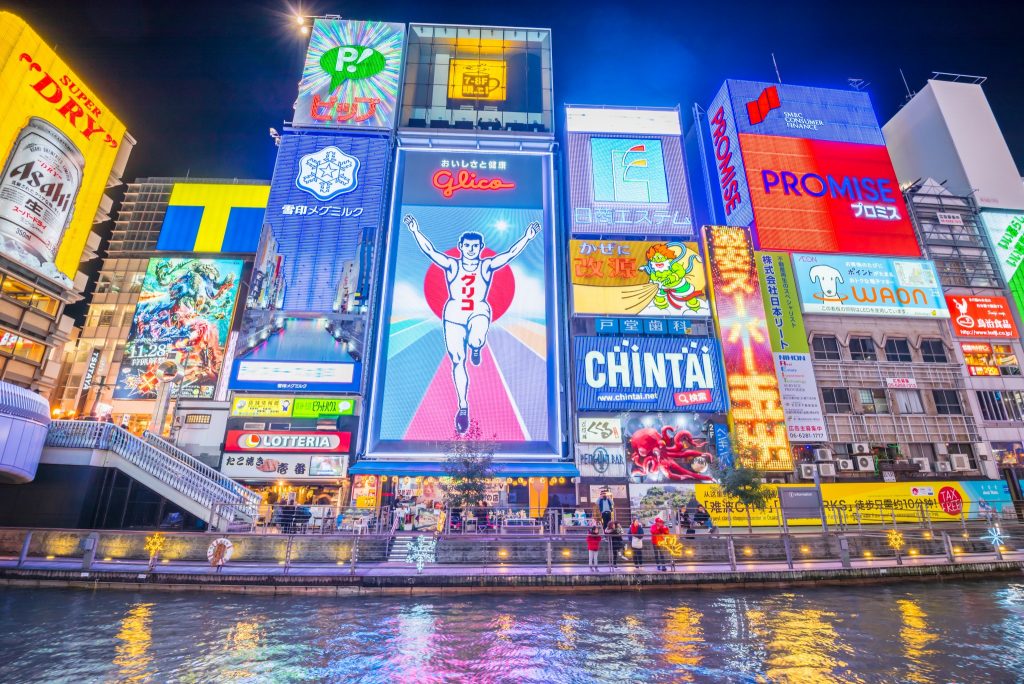
Osaka: 3 Days
- Highlights: “Forget Tokyo,” I was told when I planned my first trip to Japan, “Go to Osaka!” While the capital is awesome, Japan’s second city more than holds its own. Here you can gaze in awe at giant plastic sea creatures and effusive street vendors in Dōtonbori, wander among the tuna merchants at the fish market, and connect with history at the 16th century Osaka Castle. Get to know Osaka like a local with a highly-rated walking tour.
- Where to stay: Try AirBNB and trust the train network if you find a good option a little outside of town.
- What to eat: Try the street food on Dōtonbori! A nightfood tour will help you find the best spots and eat where the locals eat!
Kyoto: 3 days
- Highlights: Say goodbye to the furious pace of modern Japanese city life, and embrace the tranquil, spiritual and ancient in Kyoto. Believe it or not, but it's still possible to see Geisha in the historic Higashiyama District, even from a rickshaw. The gentle beauty of temples like Kinkaku-ji is simply too much to put into words. Make sure you catch everything there is to see with a custom-made walking tour with a local. Go!
- Where to stay: Downtown Kyoto is the most convenient spot for sightseeing and will allow you to cover much of the historic town on foot.
- What to eat: Restaurant prices can be steep so take a trick from the locals and stock up on tasty (and filling) instant meals at chain stores like the ubiquitous 7/11
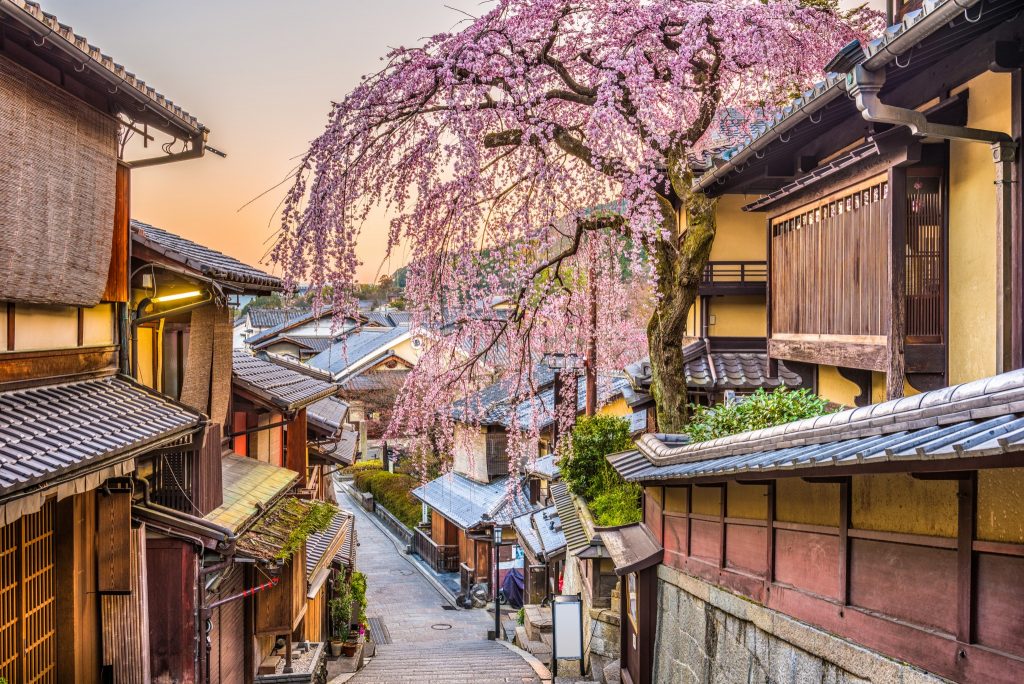
Nara: 2 days
- Highlights: In Nara park you can sip green tea in a traditional “Chaya” tea house and watch the deer frolic over 700 year old ground. Hire a local guide to make sure you catch it all!
- Where to stay. While it’s possible to day trip from Osaka, the town is well worth staying overnight – guest houses are abundant and there are even hotels in the historical park!
- What to eat. Thank the Buddhist communities in the surrounding mountains for the abundance of local vegetarian food.
Hiroshima: 2 days
- Highlights: Infamous for its more recent history (which you can learn from a local on a cycling tour), the rebirth of Hiroshima from ashes into a vibrant modern city is reason to visit in itself. In addition to haunting museums and poignant relics to the nuclear attacks, Hiroshima is the gateway to rural Chūgoku, a chance to tip your toes into Japan’s unspoiled wilderness.
- Where to stay: Hiroshima is drenched in hotels. Stay near the train station for convenient access to the city center and surrounding attractions.
- What to eat: Try the local okonomiyaki, a delicious, savory grilled pancake smothered in sauces and toppings.



14 Day Itinerary: Tokyo, Mt Fuji, Osaka, Kyoto, Nara, and Hiroshima
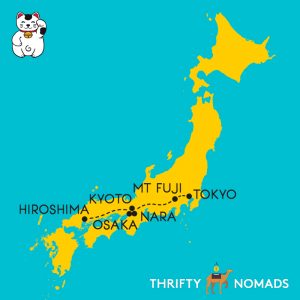 Overview
Overview
This is an itinerary for people who want it all! You’ve got two weeks, you’ve got your rail pass, and you’re going to jolly-well make the most out of your time. Well, if you’ve got the energy, then here’s how it could be done. It’s everything you see above, rolled into one epic itinerary for the bold and brave.
For this itinerary, we definitely recommend a JR pass. With the distance being covered from the east to the west of country, the amount of time and money this will save is a no-brainer. You must order your pass BEFORE you enter Japan (we recommend Klook). But if you're still unsure, be sure to check out our in-depth guide on whether the JR pass is worth it.
Tokyo: 4 Days
- Highlights: Start with the blast of energy, neon, weirdness and glamour that is Japan’s capital. Opportunities for entertainment are virtually unlimited – feel the awe of the emperor at the imperial palace, indulge in a retail fantasy in Ginza, and finish the day with a well needed pint of Asahi in Roppongi.
- Where to stay: Public transport is comprehensive so search far afield. Roppongi neighborhood if you like nightlife, Shinjuku to be close to the beating heart. Use TripAdvisor to compare hotel and hostel deals across all booking sites along with thousands of reviews.
- What to eat: The real question is what NOT to eat. You could go to a different restaurant in Tokyo everyday for 20 years and still not run out of options. If you’re on a budget, look to the local fast food chains – if you’re on a tight budget, trust to the 7/11!
Mt Fuji: 2 Days
- Highlights: Hear a rumble? Fuji-san isn’t just a stunning, snow capped mountain, it’s still an active volcano! Soak up the volcanic waters and watch Fuji’s towering form from the Five Lakes District, a popular spot for locals and and travelers.
- Where to stay: The Five Lakes Region contains a wealth of hotels and resorts. If you’re striking out, try a bit further away from (but still in plain view of) the mountain in Hakone district. Compare across booking sites with TripAdvisor's hotel search.
- What to eat: Try the regional speciality: udon noodles, often served cold in a delicate, flavorful sauce.
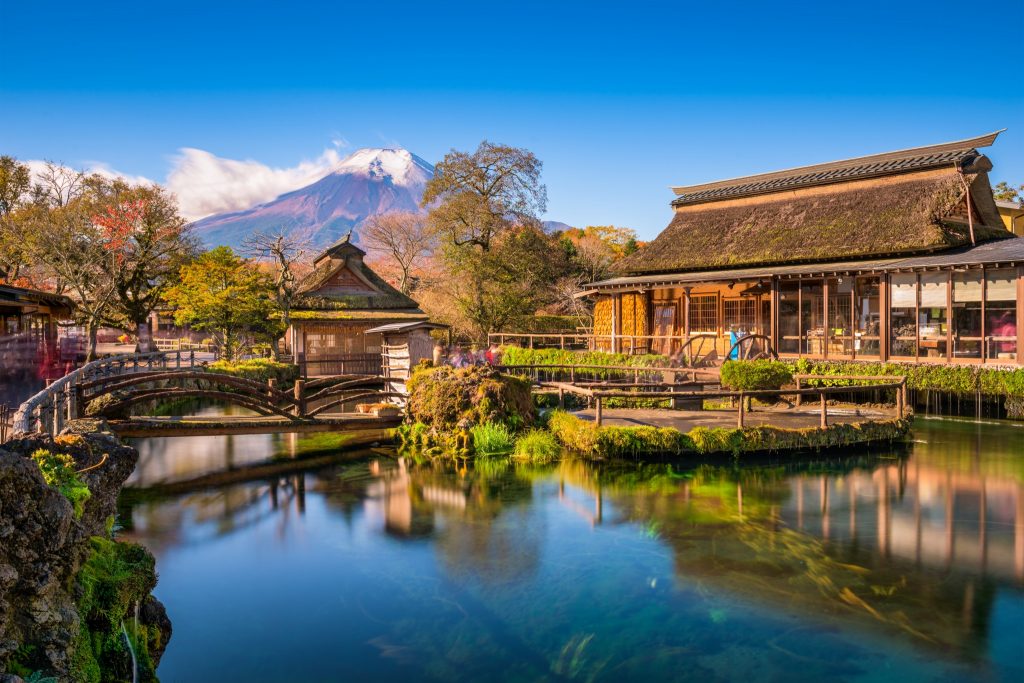
Osaka: 2 Days
- Highlights: Japan’s second biggest city is a microcosm of everything that magnetizes visitors to the country. Gaze in awe at giant plastic sea creatures and effusive street vendors in Dōtonbori, wander among the tuna merchants at the fish market, and connect with history at the 16th century Osaka Castle.Get to know Osaka like a local with a highly-rated walking tour.
- Where to stay: Try AirBNB or TripAdvisor and trust the train network if you find a good option a little outside of town.
- What to eat: The same budget chains in Tokyo will serve you well here (I practically moved in to my nearest Sushiro!) but you really must try the street food on Dōtonbori.
Kyoto: 2 days
- Highlights: After the urban grunge of Osaka, it’s time to embrace the Japan’s spiritual side at the ancient seat of empire. It’s still possible to see Geisha in the historic Higashiyama District, which you can even explore by rickshaw, and the subtle beauty of temples like Kinkaku-ji is simply too much to put into words. Make sure you catch everything there is to see with a custom-made walking tour with a local. Go!
- Where to stay: Downtown Kyoto is the most convenient spot for sightseeing and will allow you to cover much of the historic town on foot. Try Airbnb or compare hotels and hostels across booking sites with TripAdvisor.
- What to eat: Restaurant prices can be steep so take a trick from the locals and stock up on tasty (and filling) instant meals at chain stores like the ubiquitous 7/11


Nara: 2 days
- Highlights: Stick with the theme of history but swap the Geisha for sacred deer in Nara, Japan’s capital from AD 710 to 794. In Nara park you can sip green tea in a traditional “Chaya” tea house and watch the deer frolic over 700 year old ground. Hire a local guide to make sure you catch it all!
- Where to stay. While it’s possible to day trip from Osaka, the town is well worth staying overnight – guest houses are abundant and there are even hotels in the historical park! You can compare all your options and find the best price using TripAdvisor.
- What to eat. Vegetarian food and pickled delicacies are the local specialities, due to the surrounding mountains and buddhist communities.
Hiroshima: 2 days
- Highlights: Infamous for its more recent history (which you can learn from a local on a cycling tour), the rebirth of Hiroshima from ashes into a vibrant modern city is reason to visit in itself. In addition to haunting museums and poignant relics to the nuclear attacks, Hiroshima is the gateway to rural Chūgoku, a chance to tip your toes into Japan’s unspoiled wilderness.
- Where to stay: Hiroshima is drenched in hotels. Stay near the train station for convenient access to the city center and surrounding attractions. Check both Airbnb and TripAdvisor for the best prices.
- What to eat: Try the local okonomiyaki, a delicious, savory grilled pancake smothered in sauces and toppings.
With the abundance of incredible places to visit in Japan, the only trouble you'll have with planning a trip here is which itinerary to follow. Tell us, what are your must-visit's on a trip to Japan?


